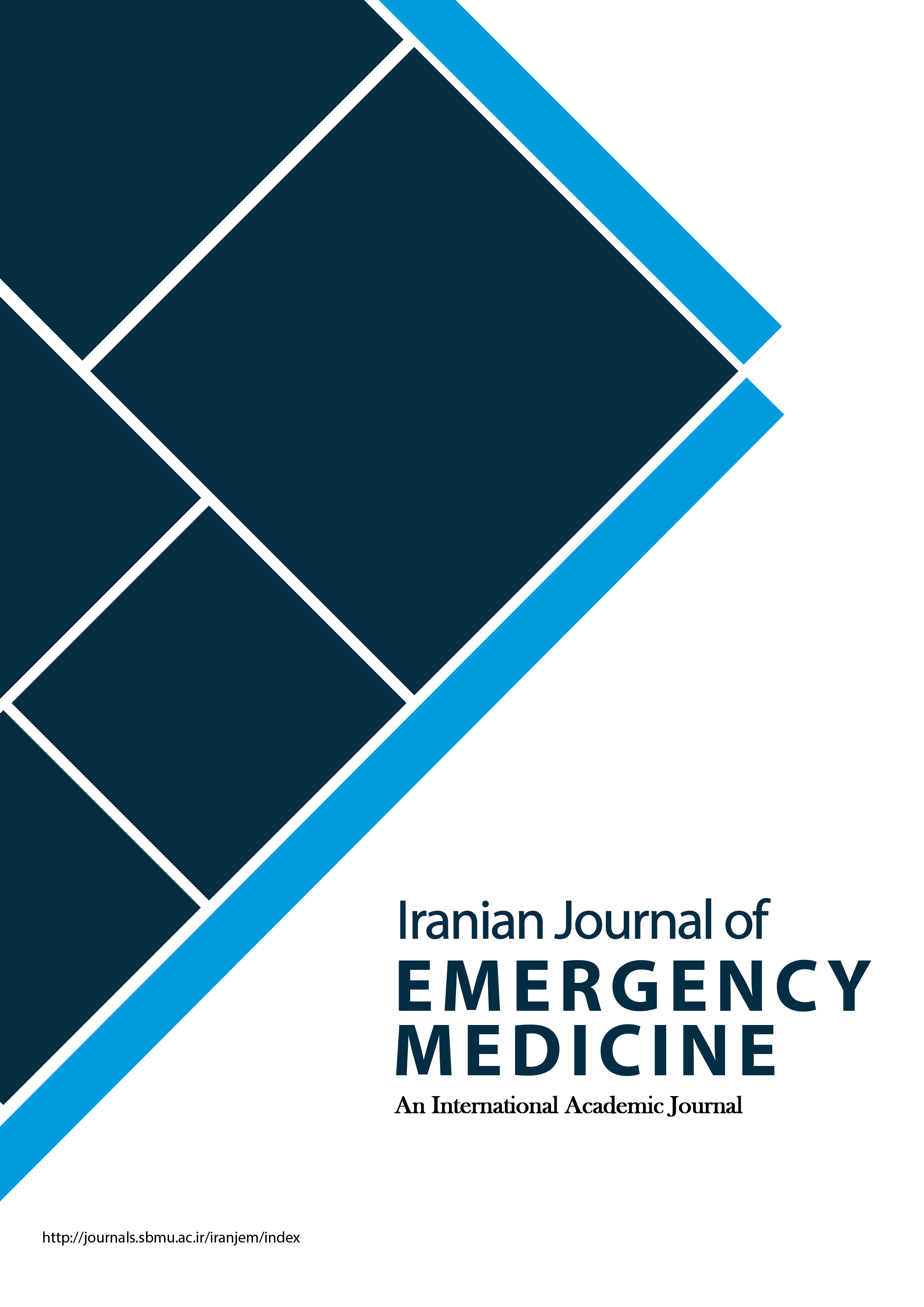Knowledge and Clinical Competence of Medical Emergencies Students in Facing Trauma
Iranian Journal of Emergency Medicine,
Vol. 3 No. 2 (2016),
6 Khordad 2016
,
Page 77-73
https://doi.org/10.22037/ijem.v3i2.10641
Abstract
Introduction: Since pre-hospital care is the first line of trauma care, its right and accurate implementation can reduce problems such as long-term disabilities and mortality due to trauma. Therefore, the present study aimed to evaluate knowledge and clinical competence of bachelor of medical emergencies students in facing trauma. Methods: The present study is a cross-sectional one. All the students of medical emergencies in Alborz University of Medical Sciences were included using convenience sampling. To gather data a demographic questionnaire, “clinical competence checklist” including 9 skills, and an oral test were used. Face and content validity, and reliability of the tool were evaluated and approved by 10 experts. In addition, reliability coefficient was calculated to be 0.82 for all the skills. Data gathering was done by taking oral and OSCE tests and observation of skill performance and filling the checklists. Data analysis was done using SPSS version 20 and using univariate t-test and Pearson’s correlation coefficient. Results: The findings of the study showed that 6.5% of the students had poor knowledge, 82.6% had fair, and 10.9% had good knowledge regarding trauma. In addition, 89.1% of the studied student had good clinical competences, and 10.9% had fair competence regarding trauma. In comparing the competence with an ideal state, there was a significant gap in all sub scales. There was a significant correlation between clinical competence level and work experience (p < 0.001, r = 0.595). However, no significant correlation existed between theoretical knowledge and clinical competence (p = 0.646, r = 0.07) or work experience (p = 0.478, r = -0.107). Conclusion: The results of this study showed that most bachelor of medical emergencies students in Alborz University of Medical Sciences had acceptable knowledge and competence regarding taking care of trauma patients in a pre-hospital setting. However, considering the significant gap between the acquired points and ideal state, continuous training in this regard seems necessary.- سرویس اورژانس پیش بیمارستانی؛ تروما متعدد؛ مهارت بالینی؛ ممیزی مدیریت؛ وضعیت آموزش
How to Cite
References
Beuran M, Negoi I, Paun S, Runcanu A, Gaspar B. History of trauma care. Chirurgia (Bucur). 2011;106(5):573-80.
Paun S, Beuran M, Negoi I, Runcanu A, Gaspar B. Trauma epidemiology: were are we today? Chirurgia (Bucur). 2012;106(4):439-43.
Murad M K, Larsen S, Husum H. Prehospital trauma care reduces mortality. Ten- year results from a time-cohort and trauma audit study in Iraq. Scandinavian Journal of Trauma, Resuscitation and Emergency Medicine. 2012; 20:13.
Peitzman AB, Sarani B. Phase 0: Damage Control Resuscitation in the Emergency Department and pre-hospital Settings. In: Pape HC, Peitzman AB, Schwab CW, Giannoudis PV, eds. Damage Control Management in the Polytrauma Patient. Springer Science + Business Media, LLC; 2010. p. 101-121.
Mauger J, Deakin CD. Initial Assessment, Triage, and Basic and Advanced Life Support. In: Soreide E, Grande CM, eds. Prehospital Trauma Care. Informa Healthcare; 2001. p. 181-201.
Beuran M, Paun S, Gaspar B, et al. Prehospital trauma care: a Clinical Review. Chirurgia. 2012;107(5):564-570.
Interpreter Group. Intermediate emergency care and transportation of the sick and injured. Tehran. Simindokht Publication.c 2005.
Shakeri Kh, Fallahi Khoshknab M, Khankeh H, Hosseini MA, Hosseinzadeh S, Haghi Monie N. Evaluation of clinical skills of medical emergency personnel in Tehran Emergency Center confronting the trauma. Journal of Health Promotion Management. 2011; 1(4): 16-24.
Obby R. Pre hospital Trauma care: Training and preparedness of and practice by medical general practitioners in Limpopo province. Thesis for master of family medicine. University of the Witwatwersrand, Johannesburg.2009.
Dadashzadeh A, Niknam F, Dehghannezhad J. Bsc Exam’s questions on Medical Emergencies. Tehran. Tazehaye Teb Publication.2011.
Studnek J R, Fernandez A R, Garifo M, Correll M. The association between emergency medical services field performance assessed by high- fidelity simulation and the cognitive knowledge of practicing paramedics. Official Journal of the Society for Academic Emergency Medicine. 2011; 18(11): 1177-1185.
Mark C Henry. EMT Prehospital Care. 3rd Edition. Department of Emergency Medicine, School of Medicine, University hospital and Medical Center, State University of New York 2005.
Kumar S, Kumar A, Agarwal Agarwal Arpit K and et al. Astudy of knowledge, attitude and practice of hospital consultants, resident doctors and private practitioners with regard to pre hospital and emergency care in Lucknow. Indian Journal of Surgery.2008; 70: 14-18.
Lammers RL1, Byrwa MJ, Fales WD, Hale RA. Simulation-based assessment of paramedic pediatric resuscitation skills. Prehosp Emerg Care. 2009 Jul-Sep;13(3):345-56.
- Abstract Viewed: 1649 times
- PDF (فارسی) Downloaded: 999 times
- HTML (فارسی) Downloaded: 168 times



